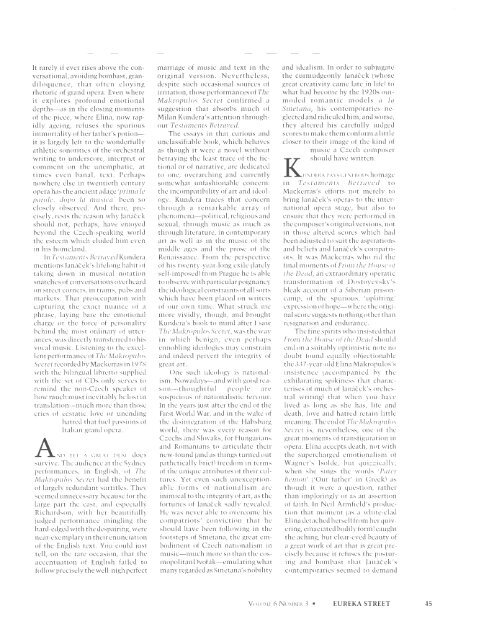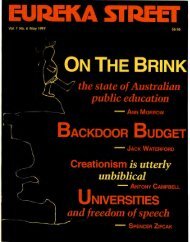Shane Malone - Eureka Street
Shane Malone - Eureka Street
Shane Malone - Eureka Street
You also want an ePaper? Increase the reach of your titles
YUMPU automatically turns print PDFs into web optimized ePapers that Google loves.
It rarely if ever rises above the conversational,<br />
avoiding bombast, grandiloquence,<br />
that often cloying<br />
rhetoric of grand opera. Even where<br />
it explores profound emotional<br />
depths-as in the closing moments<br />
of the piece, where Elina, now rapidly<br />
ageing, refuses the spurious<br />
immortality of her father's potionit<br />
is largely left to the wonderfully<br />
athletic sonorities of the orchestral<br />
writing to underscore, interpret or<br />
comment on the unemphatic, at<br />
times even banal, text. Perhaps<br />
nowhere else in twentieth century<br />
opera has the ancient adage 'prima le<br />
parole, dopa la musica' been so<br />
closely observed. And there, precisely,<br />
rests the reason why Janacek<br />
should not, perhaps, have enjoyed<br />
beyond the Czech-speaking world<br />
the esteem which eluded him even<br />
in his homeland.<br />
In Testaments BetrayedKundera<br />
mentions Janac ek's lifelong habit of<br />
taking down in musical notation<br />
snatches of conversations overheard<br />
on street corners, in trams, pubs and<br />
markets. That preoccupation with<br />
capturing the exact nuance of a<br />
phrase, laying bare the emotional<br />
charge or the force of personality<br />
behind the most ordinary of utterances,<br />
was directly transferred to his<br />
vocal music. Listening to the excellent<br />
performance of The Makropulos<br />
Secret recorded by Mackerras in 1978<br />
with the bilingual libretto supplied<br />
with the set of CDs only serves to<br />
remind the non-Czech speaker of<br />
how much must inevitably be lost in<br />
translation-much more than those<br />
cries of ecstatic love or unending<br />
hatred that fuel passions of<br />
Italian grand opera.<br />
A ND YET A GREAT DEAL does<br />
survive. The audience at the Sydney<br />
performances, in English, of The<br />
Makropulos Secret had the benefit<br />
of largely redundant surtitles. They<br />
seem ed unnecessary because for the<br />
large part the cast, and especially<br />
Richardson, with her beautifully<br />
judged performance mingling the<br />
hard-edged with the despairing, were<br />
ncar-exemplary in their enunciation<br />
of the English text. You could just<br />
tell, on the rare occasion, that the<br />
accentuation of English failed to<br />
follow precisely the well-nigh perfect<br />
marriage of music and text in the<br />
original version. Nevertheless,<br />
despite such occasional sources of<br />
irritation, those performances of The<br />
Makropulos Secret confirmed a<br />
suggestion that absorbs much of<br />
Milan Kundera's attention throughout<br />
Testaments Betrayed.<br />
The essays in that curious and<br />
unclassifiable book, which behaves<br />
as though it were a novel without<br />
betraying the least trace of the fictional<br />
or of narrative, are dedicated<br />
to one, overarching and currently<br />
somewhat unfashionable concern:<br />
the incompatibility of art and ideology.<br />
Kundera traces that concern<br />
through a remarkable array of<br />
phenomena-political, religious and<br />
sexual, through music as much as<br />
through literature, in contemporary<br />
art as well as in the music of the<br />
middle ages and the prose of the<br />
Renaissance. From the perspective<br />
of his twenty-year-long exile (lately<br />
self-imposed) from Prague he is able<br />
too bserve with particular poignancy<br />
the ideological constraints of all sorts<br />
which have been placed on writers<br />
of our own time. What struck me<br />
more vividly, though, and brought<br />
Kundera's book to mind after I saw<br />
The Makropulos Secret, was the way<br />
in which benign, even perhaps<br />
ennobling ideologies may constrain<br />
and indeed pervert the integrity of<br />
great art.<br />
One such ideology is nationalism.<br />
Nowadays-and with good rcason-<br />
thoughtful people are<br />
suspicious of nationalistic fervour.<br />
In the years just after the end of the<br />
First World War, and in the wake of<br />
the disintegration of the Habsburg<br />
world, there was every reason for<br />
Czechs and Slovaks, for Hungarians<br />
and Romanians to articulate their<br />
new-found (and as things turned out<br />
pathetically brief) freedom in terms<br />
of the unique attributes of their cultures.<br />
Yet even such unexceptionable<br />
forms of nationalism are<br />
inimical to the integrity of art, as the<br />
fortunes of Janacek sadly revealed.<br />
He was never able to overcome his<br />
compatriots' conviction that h e<br />
should have been following in the<br />
footsteps of Smetana, the great embodiment<br />
of Czech nationalism in<br />
music-much more so than the cosm<br />
opolitanDvobik-emulatingwhat<br />
many regarded as Smetana's nobility<br />
and idealism. In order to subjugate<br />
the curmudgeonly Janacek (whose<br />
great creativity came late in life) to<br />
what had become by the 1920s outmoded<br />
romantic models a la<br />
Smetana, his contemporaries neglected<br />
and ridiculed him, and worse,<br />
they altered his carefully judged<br />
scores to make them conform a little<br />
closer to their image of the kind of<br />
music a Czech composer<br />
should have written.<br />
K<br />
UNDERA PAYS GENEROUS homage<br />
in Testaments Betrayed to<br />
Mackerras's efforts not merely to<br />
bring Janacek's operas to the international<br />
opera stage, but also to<br />
ensure that they were performed in<br />
the composer's original versions, not<br />
in those altered scores which had<br />
been adjusted to suit the aspirations<br />
and beliefs and Janacek's compatriots.<br />
It was Mackerras who rid the<br />
final moments of From the House of<br />
the Dead, an extraordinary operatic<br />
transformation of Dostoyevsky's<br />
bleak account of a Siberian prisoncamp,<br />
of the spurious, 'uplifting'<br />
expression of hope-where the original<br />
score suggests nothing other than<br />
resignation and endurance.<br />
The fine spirits who insisted that<br />
From the House of the Dead should<br />
end on a suitably optimistic note no<br />
doubt found equally objectionable<br />
the 337 -year-old Elina Makropulos's<br />
insistence (accompanied by the<br />
exhilarating spikiness that characterises<br />
of much of Janacek's orchestral<br />
writing) that when you have<br />
lived as long as she has, life and<br />
death, love and hatred retain little<br />
meaning. The end of The Makropulos<br />
Secret is, nevertheless, one of the<br />
great moments of transfiguration in<br />
opera. Elina accepts death, not with<br />
the supercharged emotionalism of<br />
Wagner's Isolde, but quizzically,<br />
when she sings the words 'PaLer<br />
hemon' ('Our father' in Greek) as<br />
though it were a question, rather<br />
than imploringly or as an assertion<br />
of faith. In Neil Armfield's production<br />
that moment (as a white-clad<br />
Elina detached herself from her quivering,<br />
emaciated bodily form) caught<br />
the aching, but clear-eyed beauty of<br />
a great work of art that is great precisely<br />
because it refuses the posturing<br />
and bombast that Janacek's<br />
contemporaries seemed to demand<br />
VOLUME 6 NUMBER 3 • EUREKA STREET 45
















